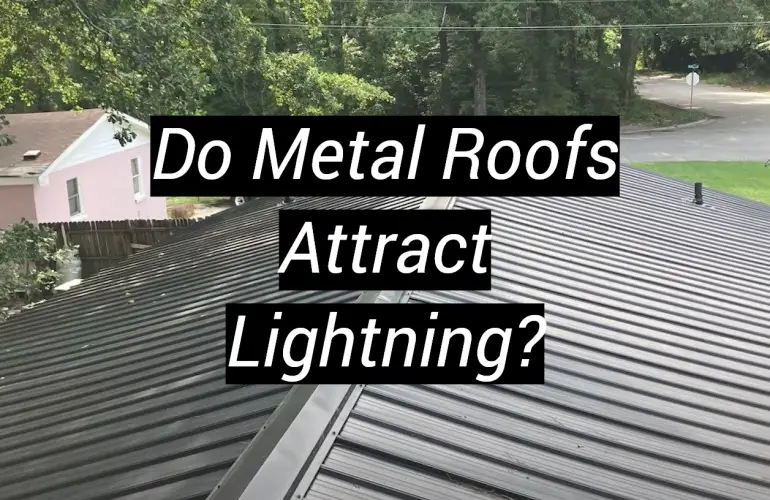Do Metal Roofs Attract Lightning?
Whether you’re looking to install a new roof or simply want to know more about metal roofs, it’s important to understand how they work and whether or not they attract lightning. Although metal roofs are known for their durability and longevity, many people worry that the material may make their home more susceptible to a lightning strike. So, do metal roofs really attract lightning? Let’s take a closer look.
Metal Roofing And The Probability Of A Lightning Strike
It’s a common inquiry whether metal roofs appeal to lightning, as many people select the material for its strength and economical value. While it’s true that metal roofs are highly conductive, this does not automatically increase the probability of a lightning strike on your home.
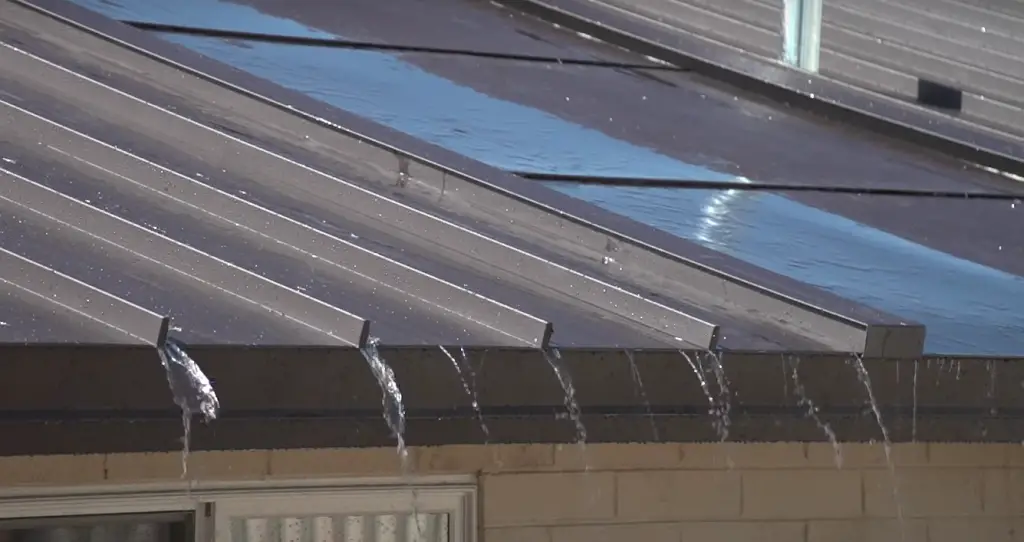
While the chances of being struck by lightning may be higher in homes with metal roofs, this is because metal roofs tend to be used more often on taller buildings—which also happen to be closer to thunderclouds and therefore at greater risk for lightning strikes. The type of metal roofing you choose won’t make any difference when it comes to attracting lightning; all types of metals can conduct electricity well.
Fortunately, there are specific steps you can take to lower the chances of being struck by lightning if your roof is made of metal. For example, if you have an antenna or chimney mounted on your home, it should be grounded properly to avoid electrical surges caused by lightning strikes. Additionally, adding lightning rods to the roof can help deflect these dangerous strikes away from your home.
In conclusion, while metal roofs may increase the likelihood of being struck by lightning due to their higher conductivity and prevalence on taller buildings, there are steps that homeowners and business owners can take in order to reduce the probability of such a strike occurring. By ensuring their structures are adequately grounded and investing in protective devices such as lightning rods, they can ensure that their properties remain safe during storms.[1]
What Is The Best Roofing Material For Lightning?
When it comes to lightning protection, metal roofs are one of the best materials to choose for your home.
However, other roofing materials such as asphalt shingles, wood shakes or tile can also provide adequate lightning protection when properly installed with an appropriate lightning rod system.At the end of the day, it’s important to remember that no single roofing material can guarantee complete safety from lightning damage. The best way to protect your home from lightning strikes is by incorporating multiple layers of protection within your overall building construction plan. This could include installing a metal roof combined with proper electrical grounding systems and lightning rods. When all of these elements are installed correctly and maintained regularly, it’s possible to reduce your chances of suffering from devastating lightning damage. [2]
Industrial Strength Durability Of Metal Roofing
Metal roofs are known for their industrial strength and durability, as they are made from strong materials such as aluminum and steel. They also have high resistance to wind, hail, fire and lightning. While traditional asphalt shingle roofs can be damaged by high winds or extreme weather conditions, metal roofs will remain intact in those instances.
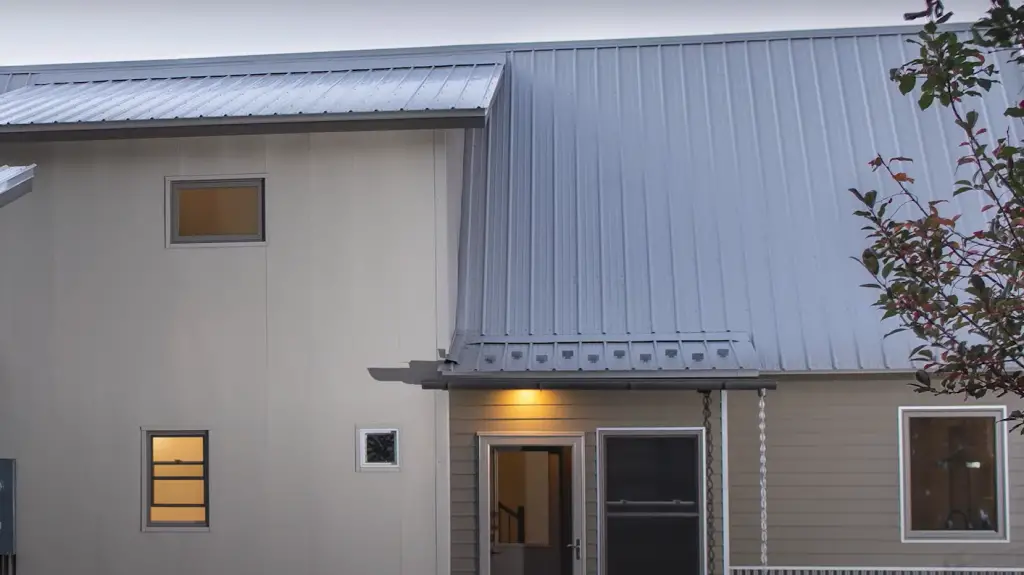
Moreover, because of the construction of metal roofing material, the chances of a lightning strike being attracted to the area are minimized. Metal items naturally deflect electricity and dissipate energy much more quickly than other materials like wood or plastic. This means that if a lightning strike were to occur near a metal roofed house, it would most likely pass around it rather than strike directly on it or through it.
This makes metal roofing an ideal choice for those who live in areas that are prone to lightning strikes, as it helps to protect the structure from potential damage. In fact, some insurance companies offer discounts on homeowner’s insurance policies when a metal roof is installed due to the increased protection it provides against natural disasters.
In addition to providing superior protection against lightning, metal roofs also require minimal maintenance and have a longer lifespan than other roofing materials.
Additionally, they are resistant to general wear and tear such as fading, cracking, chipping or peeling due to their industrial strength construction. All of these qualities make metal roofing an excellent choice for homeowners looking to invest in a long-term roofing solution.
In conclusion, metal roofs are one of the safest and most reliable roofing materials on the market due to their industrial strength, durability and ability to deflect lightning strikes. They also require little upkeep when compared to other roofing materials and can last up to 50 years or more with proper care and maintenance. For those who live in areas prone to extreme weather conditions or lightning strikes, metal roofing is a great option that provides superior protection for homes and families. [3]
Metal Roofing And The Consequences Of A Lightning Strike
Metal roofing is an increasingly popular choice for many homeowners, thanks to its durability and long lifespan. But one question that often comes up is whether or not metal roofs attract lightning? The answer is: not necessarily. Lightning strikes are random events, and no material can draw them toward it. However, when a lightning strike does occur on a metal roof, the consequences can be more severe than on other materials.
The reason why metal roofs can suffer more damage from lightning is because of their conductivity – they act as pathways for electricity to travel along, meaning that the energy released in a lightning strike could spread throughout the entire structure more quickly than with other materials like asphalt shingle or wood shake roofs. This can cause significant damage to the home, as well as a heightened risk of fire.

To help prevent this kind of damage, there are various lightning protection systems available for metal roofs. These include air terminals (such as lightning rods or antennas) which absorb the energy from a strike and direct it into the ground through heavy-duty cables to dissipate safely.
It’s also important to ensure that your home is properly grounded – this means connecting any metallic components that come in contact with the roof (including gutters and downspouts) directly to an electrical grounding system such as a ground-rod driven into the earth.
In addition, it’s always advisable to install surge protectors on your electrical appliances to minimize potential harm if a lightning strike does occur. While metal roofs do not necessarily attract lightning, it’s important to understand the potential risks and take the necessary steps to protect your home. With proper safety measures in place, you can rest assured that your metal roof isn’t putting your home at any more risk than other types of roofing materials. [4]
Types of Metal Roofs
Metal roofs come in a variety of styles and materials. The most common types are steel, aluminum, copper, stainless steel, tin or zinc alloy. Steel is the most economical and widely used material for metal roofs, while copper is the most expensive and long-lasting option. Aluminum is lightweight and corrosion-resistant, while stainless steel is strong and durable. Tin or zinc alloy roofs can also be very durable in certain climates.
Each type of metal roof has its own advantages and disadvantages when it comes to lightning safety.
It’s important to note that not all metal roofs are equally susceptible to lightning strikes. The thickness of the metal panels plays an important role in how well they conduct electricity—the thicker panels, like those made from copper, are not as conductive as the thinner panels made from steel and other metals. Additionally, metal roofs have a protective coat of paint or sealant that further prevents lightning strikes by reducing the amount of electricity they can absorb.
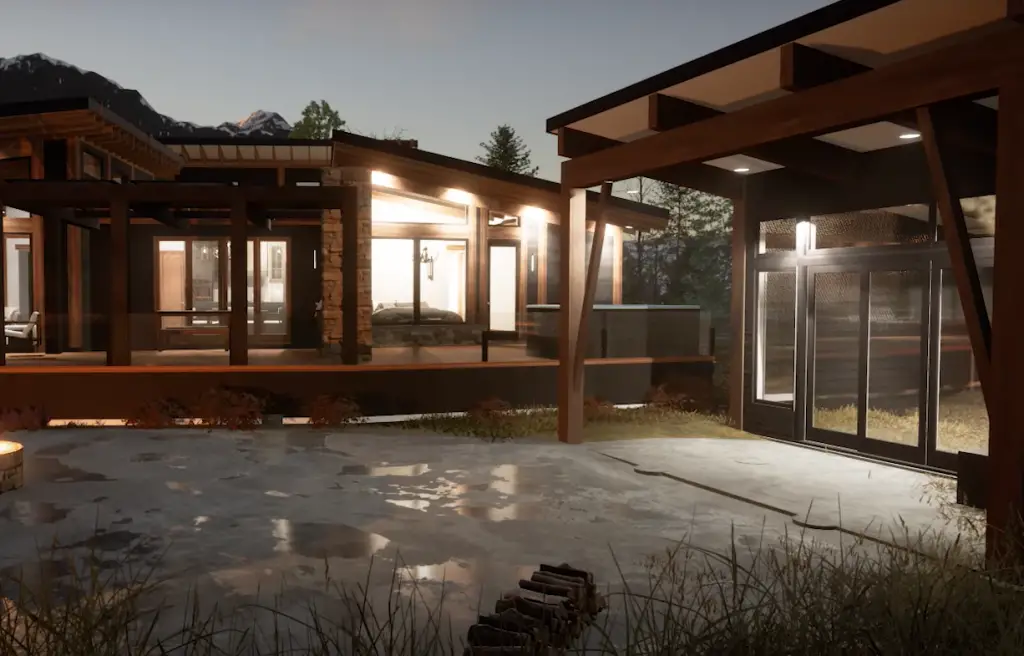
In general, metal roofs are no more likely to attract lightning strikes than other types of roofing materials such as asphalt shingles or wood shakes. In fact, in some cases, metal roofs may even be safer than traditional roofing materials since their metallic properties can help disperse the electrical charge from a strike more safely throughout the building. However, it’s always important to take precautions when installing any type of roofing material near an area prone to lightning storms—including metal roofs. This includes making sure all wiring and lightning rods are up to code and that any standing water near the roof is removed. Taking these steps will ensure your home or business is protected from lightning danger.
Factors That Influence Commercial Roof Lightning Strikes
Size and Expense
The size of a commercial roof is one of the primary factors that affects whether or not it is prone to lightning strikes. A larger roof increases the chances of a strike, as does an expensive roof with more metal components.
Location
The geographic location of the building also plays an important role in determining how likely a roof is to be hit by lightning. Areas that experience frequent thunderstorms and high humidity are more prone to the risk of lightning strikes than areas with dry climates.
Protection
Installing lightning protection systems on commercial roofs can help reduce the risk of damage from lightning strikes. Lightning rods, surge protectors, and grounding cables can all provide increased protection for buildings during storms. Additionally, using materials such as copper or aluminum, which are more resistant to lightning, can also decrease the risk of damage. [5]
Proximity to Geographical Features
If a commercial building is located close to large bodies of water, tall trees, or mountain ranges, it has an increased chance of being struck by lightning. The higher altitude and additional sources of moisture in these areas can increase the frequency of electrical storms.
Overall, metal roofs do not necessarily attract more lightning than other roof types; however, certain characteristics such as size, expense, location and protection measures can significantly affect the risk of a lightning strike. To minimize the chances of roof damage due to lightning, it’s important to consider all potential factors before making any decisions.
More About Lightning Strikes
Lightning is a very powerful and dangerous force of nature, and it can cause serious damage to any structure that it strikes. Metal roofs are no exception. In fact, many people believe that metal roofs may be more susceptible to lightning strikes than other types of roofing due to the conductivity of the material.
However, research has shown that in reality there is no difference in how often metal roofs are struck by lightning compared to other types of roofing materials. The same frequency applies regardless of the type of material used on your roof. That said, metal roofs do provide some advantages when it comes to safety from lightning strikes: they are able to disperse energy away from the structure as well as ensuring a much faster flow-off of any water that may be present.
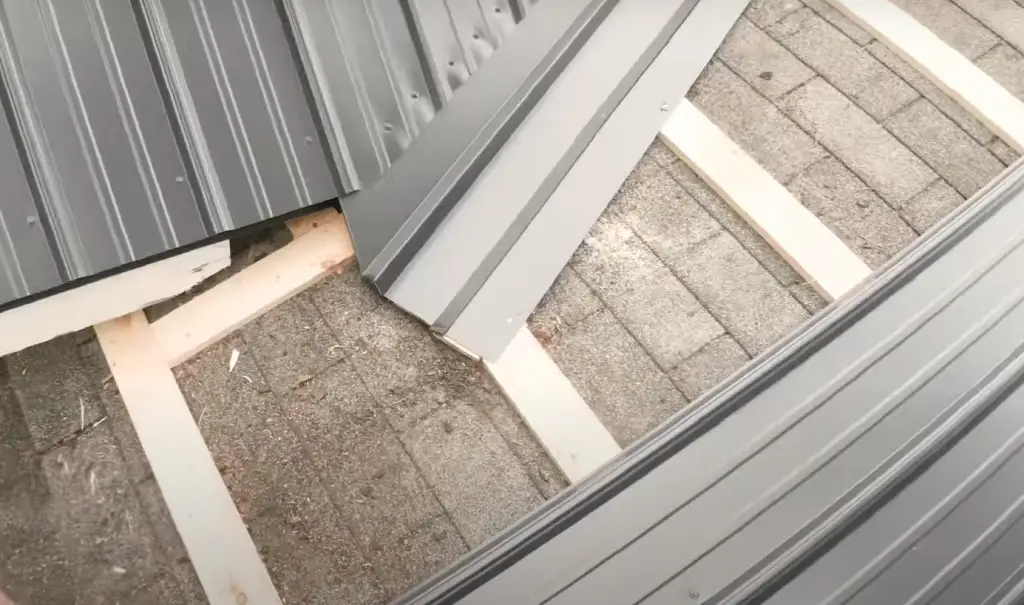
When it comes to safety, metal roofs also have some drawbacks. For instance, they can be noisy in inclement weather. Additionally, metal roofing is more prone to damage from hail and other extreme weather conditions than other materials like asphalt shingles or terra cotta tiles. [6]
FAQ
Do you need a lightning rod with a metal roof?
The simple answer is no. A lightning rod is typically used to protect a roof made of combustible material, such as wood shingles or cedar shakes. Metal roofs are noncombustible and therefore do not need a lightning rod. However, they may still be susceptible to damage from lightning strikes in certain circumstances, so it’s important to make sure that your metal roof has appropriate grounding and bonding wires installed during installation. This will help disperse any electrical currents that come through the roof quickly and safely into the ground rather than cause sparks or other damage to the home or its occupants. Additionally, if you live in an area with regular thunderstorms or high winds, it may be wise to install a lightning protection system for additional peace of mind.
Can a metal roof be damaged by lightning?
Yes, in certain circumstances, a metal roof can be damaged by lightning. If the home or building is not properly grounded and bonded with protective wiring, sparks could cause damage to both the surface of the metal roof and potentially any combustible material underneath it. Also, if there is no lightning protection system installed on your home, a direct strike could cause significant damage to the metal panels of the roof itself as well as any electrical components within the home. To help prevent this type of structural damage, make sure your metal roof has appropriate grounding and bonding wires at installation and consider installing a lightning protection system for added safety.
Does a metal roof increase my chances of being struck by lightning?
No, a metal roof does not increase your chances of being struck by lightning. However, having a metal roof may make it more likely that any direct strike will lead to damage to the home or occupants.
Are there additional precautions I should take when installing a metal roof?
Yes, there are additional precautions you should take when installing a metal roof. Make sure proper grounding and bonding wires are installed during installation. Additionally, if possible, install some sort of lightning protection system for added safety against potential strikes. Also be sure to check your local building codes for any additional requirements that would need to be met. Finally, if you live in an area with frequent thunderstorms or high winds, it’s wise to use corrosion-resistant materials and fasteners when installing the roof to ensure that the metal panels remain secure even during inclement weather.
Does a metal roof affect WI-FI?
No, a metal roof does not typically affect Wi-Fi signals. Metal roofs can act as Faraday cages, meaning that they block out external electromagnetic radiation, but the signal from your router is strong enough that it should be able to penetrate through the roof without any difficulty. However, if you are having trouble with weak signal strength in certain areas of your home, consider moving your router closer to those locations or adding additional access points for boosting the signal. Additionally, installing grounding and bonding wires during installation of the metal roof may help improve signal strength as well.
Do you need to ground a metal roof?
Yes, it is important to ground a metal roof for safety reasons. Grounding and bonding wires should be installed during installation of the metal roof to help disperse any electrical currents that come through the roof quickly and safely into the ground rather than cause sparks or other damage to the home or its occupants. Additionally, if you live in an area with frequent thunderstorms or high winds, consider installing a lightning protection system as well. Doing so will provide extra peace of mind against potential lightning strikes. It’s important to consult your local building codes for any specific requirements before beginning construction on your metal roof.
Useful Video: Do Metal Roofs Attract Lightning?
Conclusion
The answer to whether or not metal roofs attract lightning is complex. While metal roofs can act as a conductor for the electrical charge, it is highly unlikely that they will be struck by lightning compared to other materials like wood because of their ability to dissipate electricity. That being said, all structures should have appropriate lightning protection systems installed regardless of the material used in order to ensure maximum safety. A combination of proper installation, maintenance, and avoidance of dangerous activities during storms can help reduce the risk associated with lightning strikes on any structure.
Ultimately, it’s best to take precautions no matter what type of roof you have in order to stay safe and protect your home from possible damage.
References:
- https://www.bushburycladding.co.uk/does-having-a-metal-roof-make-farm-buildings-vulnerable-to-lightning/
- https://www.decra.com/blog/what-happens-when-lightning-strikes-a-metal-roof
- https://www.bdcnetwork.com/blog/are-metal-roofs-lightning-magnets
- https://www.bridgersteel.com/blog/metal-myth-a-metal-roof-attracts-lightning-strikes
- https://www.buildingenclosureonline.com/articles/86925-lightning-protection-for-buildings-with-metal-roofs
- https://www.rpsmetalroofing.com/what-happens-when-lightning-strikes-a-metal-roof/

